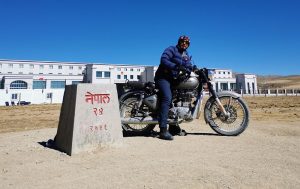Bhim Nath Baral
Associate Professor, Department of Political science
Tribhuvan University, Prithvi Narayan Campus
Pokhara, Nepal
baralbhimnath@gmail.com
Begin text.

Nepal and China share a longstanding history of diplomatic ties, rooted in economic, social, cultural affinities and geographic proximity. The rugged land topography that separates these two neighborly nations has historically posed challenges, particularly in terms of trade and connectivity.
The ancient routes through Tibet served as crucial routes for communication between the two countries. In 2019, the closure of the Corala Pass, a vital gateway, disrupted these age-old connections. However, the recent reopening of the pass marks a transformative moment, ushering in new opportunities for collaboration, trade, commerce and cultural exchanges. The geographical proximity continues to be a decisive factor, emphasizing the importance of fostering and strengthening these historical ties for mutual benefit.
It is a matter of glory and pride for a landlocked country like Nepal to be connected with a powerful neighbor. The Corala Pass-the fourth China-Nepal land port after Keyrung, Khasa and Purang port, officially reopened on November 13, 3023. It is an important outcome of President XI’s visit to Nepal in 2019 and the consensus reached by the leaders (diplomats) of the two countries during PM Prachanda’s visit to China.
With the reopening of the pass, new opportunities have emerged for the residents of Mustang district in Nepal. Now, individuals from all five local units who possess identity cards issued by the District Administration Office in Mustang can visit Nechung Lizi Bazar.

Previously, only those from Lomathang and Loghekar Damodar Kunda had this privilege. The significance of Corala Pass extends beyond facilitating local travel, as it serves as a crucial link connecting the Gandaki province to the rest of the country. This expanded and extended access marks a positive step in enhancing connectivity and promoting regional integration, fostering economic and cultural exchanges between Mustang and the broader nation.
______________________________________________________________________________
“The opening of Corala Pass is encouraging indeed, however, now both China and Nepal must work hard for its systematic use for the benefit of the two ancient nations. Equally true is that some countries ,near and far, must have felt puzzled with the sudden opening of the Corala Pass.
Regular operation of Corala Pass is undoubtedly a positive development for Nepal and China as stated earlier, offering opportunities for increased trade, cultural exchange, and diplomatic collaboration. However, it is crucial for the Gandaki Province government to recognize its pivotal role in maximizing the benefits of this pass for its constituents. By addressing infrastructure gaps and actively participating in cross-border initiatives, the province can play a vital role in shaping a prosperous future for the region. It is the golden opportunity for the region.”
_____________________________________________________________________
The Corala Pass, considered one of the easiest passes for travel and trade between Nepal and China, holds strategic importance for both nations, China and Nepal. Its sudden closure during the Covid-19 pandemic highlighted the vulnerability of such crucial entry points during global crises. Now, as the pass reopens, it brings hope for economic revival and strengthened diplomatic ties.

In a significant development that promises to strengthen ties between Nepal and China-the two ancient nations, the Corala Pass, a vital entry point connecting the adjoining Tibet and Gandaki Province, has reopened after being closed during the tumultuous period of the Covid-19 pandemic. This reopening is not only a testament to the resilience of international relations but also offers a plethora of opportunities for both nations.
However, the path ahead is not without challenges. It has bitter history of uncertainties of the continuation mainly because of China’s legitimate security concern. The preparation on the Nepalese side also appears to be lagging far behind. China has displayed proactive commitment by constructing essential infrastructure in the northern portion of the 24th no pillar.
This underscores China’s dedication to facilitating smooth cross-border movements and trade. On the contrary, serious concerns arise as Nepal’s preparedness for the pass’s reopening appears to be inadequate. There seems to be a lack of visible concern from the provincial government, raising questions about the prioritization of regional interests. The lack of basic infrastructure and efficient systems on the Nepalese side may hinder the seamless flow of goods and people.
The reopening of Corala Pass surely holds immense positive impacts for Nepal’s overall economy. It marks a significant step in reducing heavy dependency on India and diversifying trade routes. The increased connectivity promises to flourish trade, fostering economic growth in the region.

Strategically, it enhances Nepal’s bargaining power with the Southern neighbor in relation to trade and transit. As a key entry point, Corala Pass has the potential to contribute substantially to the prosperity of both Gandaki Province and the entire country, opening up new avenues for collaboration and development of opening of Corala pass.
It is a good beginning which is timely indeed. The Chinese side deserves deep appreciation.
To maximize the advantages of Corala Pass, the Nepali government must go beyond mere buying and selling of goods. It is crucial for the government, both at the provincial and federal levels, to proactively determine export-import policies, chart the course of foreign trade, and evaluate cost-benefit analyses.
_____________________________________________________________________________
“Strategically, it enhances Nepal’s bargaining power with the Southern neighbor in relation to trade and transit. As a key entry point, Corala Pass has the potential to contribute substantially to the prosperity of both Gandaki Province and the entire country, opening up new avenues for collaboration and development of opening of Corala pass.It is a good beginning which is timely indeed. The Chinese side deserves deep appreciation.”
___________________________________________________________________________
Comprehensive policies should be formulated to encourage local municipalities to plan effectively, incentivize investors, and emphasize local production. Education and awareness campaigns should be launched to inform the masses about the potential benefits and opportunities associated with the pass, fostering a collective understanding of how to harness its potential for sustained economic growth and development.
No doubt, foreign policy matters fall under the jurisdiction of the federal government. Hence, the federal government has few important roles to play. However, Gandaki Province’s direct involvement with Corala Pass cannot be ignored. The province shares a unique geographical and economic bond with the pass, making it imperative for the Gandaki provincial government to actively participate in its affairs. The provincial government can have significant roles in ensuring the effective utilization of the freshly opened Corala Pass for the benefit of its residents.
It is essential to have active engagement with the federal government to ensure the province’s specific needs and concerns. The province should focus on formulating and implementing regional policies that align/match with federal guidelines, optimizing the economic and strategic potential of the pass for local development.

Infrastructure development on the Nepalese side of the pass is crucial. This demands the immediate efforts should be made to prepare required infrastructures in a planned way. To this the provincial government should collaborate with the federal government and secure investments to enhance connectivity and trade facilitation.
Encouraging local municipalities to strategize and plan effectively for utilizing the pass, promoting local production, and attracting investors will contribute significantly to regional development. Careful collaboration as well as coordination with China is essential to harness the pass’s potential for economic growth and regional development. Additionally, the province must prioritize education and awareness campaigns to inform the local population about the opportunities arising from the pass’s reopening, fostering a sense of ownership and participation in the development process. Finally, we need to address the security concern of China’s underbelly Tibet (China) and be cautious in curbing transnational crimes along with trade deficit that Nepal has been facing.
Despite China’s recent opening of the Corala Pass, uncertainty delays among the Nepali people due to historical fluctuations in China’s decisions regarding the pass’s accessibility. The unpredictable nature of the Chinese government’s stance on border crossings has left many in doubt, as the opening and closing of such passes seem to be subject to shifts in diplomatic and geopolitical considerations rather than consistent policies.
China must ponder over this issue.
This uncertainty has contributed to a cautious attitude among Nepalis regarding the reliability of cross-border access through the Corala Pass. It is urgently needed to erase such confusion. Effective diplomatic dialogue with China is imperative to address the associated concerns about the reliability of the Corala Pass’s opening and closing.
The Nepali side must be duly assured by China on this issue.
While it is true that such fluctuations are not uncommon, engaging in serious diplomatic discussions with China, either in Kathmandu or in Beijing, can pave the way for more consistent, regular and uninterrupted operations. By fostering open communication channels, both the nations can collaboratively work towards ensuring the pass remains a stable and reliable conduit for trade and connectivity. Diplomacy becomes the key tool in navigating these challenges and establishing a foundation for a trustworthy and enduring relationship in the management of crucial border crossings.
The opening of Corala Pass is encouraging indeed, however, now both China and Nepal must work hard for its systematic use for the benefit of the two ancient nations.
Equally true is that some countries ,near and far, must have felt puzzled with the sudden opening of the Corala Pass.
Regular operation of Corala Pass is undoubtedly a positive development for Nepal and China as stated earlier, offering opportunities for increased trade, cultural exchange, and diplomatic collaboration. However, it is crucial for the Gandaki Province government to recognize its pivotal role in maximizing the benefits of this pass for its constituents. By addressing infrastructure gaps and actively participating in cross-border initiatives, the province can play a vital role in shaping a prosperous future for the region. It is the golden opportunity for the region.
End text.
# The author has also the credit of ‘Neighborhood Interest in Nepal: A Geopolitical Perspective’ ‘Dimensions of Nepal-China Relations & Nepal-China-India: Prospect and Challenges of Trilateralism’ related to this article.
# Time permitting, we shall approach the distinguished author to award permission to publish his works (Dimensions of Nepal-China Relations & Nepal-China-India: Prospect and Challenges of Trilateralism) for the larger audience both within and without: Ed. Upadhyaya. N. P.
